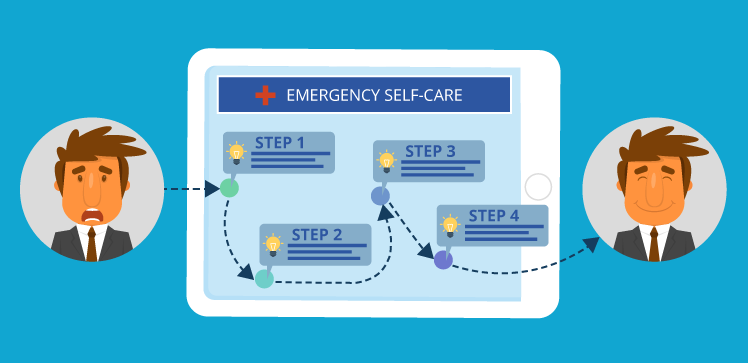Mental Health Apps: How Mobile Apps Help with Mental Disorders
Editor's note: In this article, Anastasia explains how mobile applications can revolutionize mental health treatment for both therapists and patients. If you want to build a tailored solution for your organization, contact ScienceSoft for comprehensive mental health app development services.
The key points of a mental health professional's work with any kind of mental disorders include, but are certainly not limited to, three goals. The first goal is to help a patient accept their disorder as a chemical imbalance or brain dysfunction without taking the blame for it, (just like nobody blames themselves for having asthma, for example). The second is to assure a patient that there is a path to recovery or coexistence with their condition. Finally, the third goal is to guide their patient along.
Mobile patient apps can assist with the three goals and significantly support the work done by mental health professionals. Let's take a look at the types of apps that can become an indispensable part of mental illness therapy.
Mood tracking apps

Mental illnesses are often accompanied by mood swings that can completely derail a person's life. To gain control of these swings, it's important to learn one's individual patterns that lead to them. But first, a person should recreate and see through these patterns. That is what mood tracking apps help with.
The core idea of this type of mental health app is a digital mood diary that collects patient entries over time and shows mood stats in the form of various graphs for convenient analysis with a therapist. The entries can take multiple forms, too, and be as simple or as elaborate as both a user and a mental health professional agree them to be. For instance, the app can prompt a person to choose an emoticon that best illustrates their current mood. Alternatively, it can give a list with 10 pairs of antonymous adjectives that describe feelings and emotions and ask a person to choose the most relatable one in each pair.
For the sake of data consistency, the app can remind its users about making an entry at a set time period. This way, it will gradually and effectively collect information for a patient and a therapist to later work with.
Emergency mental self-care apps
Sometimes mood swings can lead to dangerous emotional spikes and downfalls. These radical mood changes may result in manic episodes, panic attacks, self-harm urges, or even suicidal thoughts. Since these episodes are recurring and can be very frequent, too, patients may eventually feel like they're a burden for their therapist or loved ones and will stop turning to anyone for help when they need it most.
However, the danger and a patient's anguish remain, so, along with reassuring them to always reach out to others' help, a therapist can suggest using an emergency self-care app. It can remind the patient about the causes behind the episode by displaying textual or visual explanations that were created by their mental health professional. This way, a person will remember that their behavior is a mental 'glitch' they have to endure.
The app can also contain individual techniques that will help a patient deal with their episode more easily. With the help of interactive messages, an app can walk a patient through the steps to overcoming a panic attack or resisting a self-harm urge. Having at least this kind of backup in a mobile device can give a person an additional boost of confidence and peace of mind, and even prevent a fatal decision.

Remote group support/therapy apps
Many people with mental disorders tend to distance themselves from their friends and family. However, this isolation is equal to locking oneself in a virus-filled room and letting the dysfunctional mind reinforce its ill and unsound influence. Any therapist would do their best to explain this to a patient and ask them to regularly engage in communication with others, but providing a convenient tool for supportive communication can be a more effective alternative.
A mobile app can offer two types of remote contact, and mentally ill patients will be able to benefit from them both. The first one is a possibility to contact a mental care professional. Whether it's a regular telemedicine e-visit or an emergency session, the mobile app guarantees a safe and reliable audio/video connection. Such apps can also have text chat windows for patients who feel uncomfortable talking live.
The second option is a virtual group chat that connects patients who are suffering from the same condition and are trying to find the path to recovery. Reassurance that they are not alone in their struggles can help mentally ill patients feel less weak and vulnerable.
Addiction tracking apps
Many types of addictions are classified as mental health issues: after all, it's the mind that is fixated on a certain behavioral pattern. Besides, addiction can sometimes stem from the irrational belief that the habit isn't bad or that breaking it can be dangerous.
Tracking apps can help a patient acknowledge their habits, find out their causes and consequences, as well as log the number of their urges and times or days they've been able to resist them. Along with understanding that they're making steady steps toward recovery, patients can enjoy the gamification elements of such apps that will let them get virtual prizes for their progress.
Meditation apps
Meditation apps can be used more generally, but are also helpful in combination with emergency care apps. Such apps can offer effective stress management and relaxation tips prepared by mental health professionals. They can also contain breathing technique manuals as well as audio relaxation or meditation sessions that will be useful for those suffering from anxiety, insomnia, or OCD.
All-in-one app
A universal solution would be an app that has all the features listed above. Since none of the features are complex in implementation, such an app can remain lightweight and easy to navigate while offering multiple functional possibilities.
On a final note
Many mentally ill people try to deal with their condition on their own, but whether they manage to do it or not isn't the issue of 'strength'. Sheer force of will can cure neither a broken bone nor a broken mind.
Mental health apps can help therapists take their services to the next level and allow patients to have better control over their everyday lives. With these mobile apps, mentally ill people can track their mood swings and addiction urges as well as get support in any form they find comfortable, from impersonal communication with the app to connecting with other people who are fighting the same disorders.

